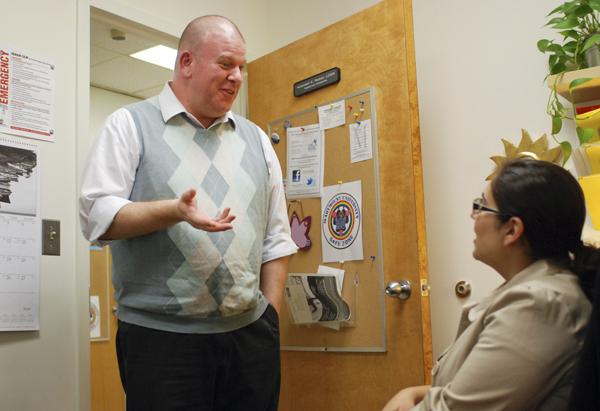The University Counseling Center director is lobbying for funding to help mobilize the campus to prevent suicide, an issue that has come into focus after a freshman killed himself earlier in January.
UCC director Silvio Weisner said this week he hopes to secure tens of thousands of dollars from the University budget to hire a suicide prevention specialist and expand training for faculty and staff by paying for online tutorials. The training would help the community to more quickly identify students struggling with severe cases of depression.
“As we move forward into the next budget year, I’m certainly looking into campus-wide systemic ways to provide training and education around suicide prevention and really on identifying students with distress,” Weisner said.
It is the University’s first mental health-related response to the suicide of freshman Sean Keefer, who took his own life in his West Hall residence hall in January. The last reported suicide on campus before that took place in 2011.
He said there are many “gatekeepers” in all areas of campus that can intercept an at-risk student before it is too late, but they largely need to better understand the signs with training.
At a large university like GW, Weisner said it’s impossible to mandate suicide prevention training across campus. But he said the resources would improve existing efforts to train faculty, administrators and residence hall staff at conferences and workshops.
Since hiring Weisner, the University has gradually upped the center’s budget, highlighting its commitment to mental health awareness on campus. Last year the center was given a $200,000 increase to hire specialists for international students and veterans.
GW also launched a mental health referral system called CARE Network two years ago, in which students and employees can call attention to individuals who may need extra support.
Weisner said he’s seen more reports from the system being referred to UCC this year, but could not provide specific numbers because his office did not keep them.
Falling through the cracks
The focus on suicide prevention comes as the center still tries to lessen waitlist times, which has drawn complaints for years.
Weisner has made strides since he arrived at the counseling center in 2012, expanding walk-in hours, adding group sessions and hiring three specialists. But he said the center still needs more money to better identify at-risk students and help more quickly or some will fall through the cracks.
Marianne, a freshman who spoke on the condition that her last name would not be published, said she waited more than three months after asking for an appointment in November.
While she was on campus over Thanksgiving break, she said she called GW’s overnight mental health services hotline during a panic attack, but hung up in frustration because the staff member was unable to calm her down. Police officers were then dispatched to her residence hall to escort her to the GW Hospital.
After the hospitalization, she tried to get an appointment at UCC, but was told there was a backlog of appointments and encouraged by counseling staff to seek help off campus.
Strapped for cash, Marianne said she could not afford to see an outside counselor.
“I didn’t have the money to find someone. I wanted to be scheduled with the University because the first six sessions are free. But it took being hospitalized and four months before I got a call,” she said.
Marianne said UCC needs to make sure students who need help are not left waiting – especially when they are thousands of miles away from their families and do not go home during breaks. She also said counselors should take financial concerns into consideration when placing students on the waitlist.
Measuring the waitlist
Weisner said he could not comment on specific cases, but that November to the spring is typically a very high demand period. He said many appointment requests would roll over from one semester to the next, but would not say how many students were still waiting for appointments.
Being transparent about the length of a center’s waitlist is a best practice at college centers nationwide, said Karen Bower, a lawyer who specializes in cases dealing with mental health services on college campuses.
She said prospective students specifically should be provided with the number of the counselor per student ratio and how long the wait list is before making a decision on where they should apply.
“That information should be available. It shouldn’t be a secret they are keeping,” Bower said.
She added that other important factors include if there is a cap on appointments or if sessions are free. “They’re all really important questions for students to consider. Every effort should be made to understand that,” she said.
Farrah Hasnain, the president of the GW chapter of the suicide prevention organization To Write Love on Her Arms, said she had similarly heard several stories of the waitlist recently keeping students waiting three months.
“If you’re in crisis mode, it’s not good at all,” Hasnain said.








